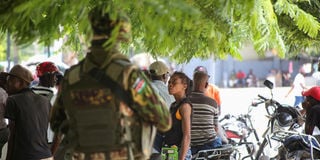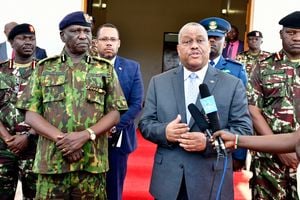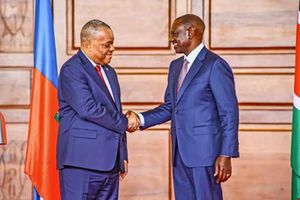
A Kenyan police officer stands guard during a joint operation with Haitian police, in Port-au-Prince, Haiti July 29, 2024.
The first contingent of female police officers drawn from the Special Weapons and Tactics Team (SWAT) will be deployed to Haiti in November.
They will be in a contingent of an additional 600 officers scheduled to join their colleagues already leading an international policing mission in the Caribbean nation.
Some 396 Kenyan police officers, who were deployed in two groups, are already battling gangs in Haiti as part of the United Nations-backed Multinational Security Support (MSS) Mission.
It will be the first time Kenya is sending female officers for the mission.
Currently, the officers are undergoing training at the National Police College Embakasi “A” Campus.
Other officers expected to travel to Haiti are drawn from the General Service Unit (GSU), Anti-Stock Theft Unit (ASTU), and the Rapid Deployment Unit (RDU).
Given Kenya is the lead country, the mission’s commander is Godfrey Otunge and he is deputised by Colonel Kevron Henry of Jamaica, the other country that has already sent troops.
The Kenyan officers who have been in Haiti since June have held joint operations with the Haiti National Police (HNP) leading to the recapture of key installations such as the general hospital, the port, and the national palace that had been seized by gangs.
Other countries that pledged troops for the mission are yet to deploy. These are the Bahamas, Antigua, Barbuda, Italy, Spain, Mongolia, Senegal, Belize, Suriname, Guatemala, and Peru.
The Caribbean nation has reeled from years of violence as gangs that enjoy close ties to the country’s political and business leaders have vied for influence and control of territory.
President William Ruto on October 11 asked the international community to honour the pledges to provide resources for the mission.
The President said the Kenyan-led mission, which has secured a one-year extension from the UN, does not have enough budget to finance operations until October 2025.
“We have a budget that takes us to March next year, so in terms of being able to support our officers on the ground, including those joining next month, we have adequate resources,” President Ruto said.
“Words and pledges must be matched by concrete action. We therefore strongly implore our global partners to accelerate their contribution to the personnel, logistics, and financial resources necessary to sustain and expand the mission,” he added.
President Ruto spoke last week at State House where he hosted Haiti Prime Minister Garry Conille.
Meanwhile, in Haiti, Kenyan officers on Tuesday raided the base of a gang leader who is wanted by the US Federal Bureau of Investigations (FBI). But he was not seized during the raid.
Vitel’ Homme Innocent, who is the leader of the Kraze Barye gang, is listed among the FBI’s 10 most wanted fugitives.
According to the FBI, Innocent allegedly worked together with the gang 400 Mawozo, in the October 2021 kidnapping of 17 Christian Missionaries in Haiti, including five children.
The hostages were allegedly held at gunpoint and most remained captive for 61 days. The gangs demanded ransom payments for each of the victims.
It is also alleged that in October 2022, the Kraze Barye gang killed a US citizen during a kidnapping attempt and kidnapped another in Haiti.
FBI has offered a Sh258 million reward for anyone with information that will lead to his arrest.
The FBI states that Innocent struck a deal with the 400 Mawozo gang to operate within the Croix-des-Bouquets area.
He is sanctioned by the US, the UN Security Council, and the European Union.
Meanwhile, a diplomatic tiff between Haiti and the Dominican Republic is brewing.
Dr Conille has accused the Dominican Republic of deporting Haitian nationals who had sought refuge there.
“The forced and mass deportation of our Haitian compatriots from the Dominican Republic is a violation of the fundamental principles of human dignity,” the Prime Minister said.
It is following his request that the Organization of American States (OAS) hold an urgent meeting on Tuesday regarding the most recent mass deportation of Haitian immigrants by the Dominican Republic.
Gandy Thomas, Haiti’s Permanent Representative to the OAS, said a solution should be found to the “widespread discrimination” to restore respect for fundamental human rights.
A week ago, over 70 people were killed in Haiti and hundreds of others were left injured following an attack by gangs.
Some of the displaced Haitians fled to the neighbouring Dominican Republic. Days later the deportations kicked off.
In February, rising attacks led to the resignation of Mr Ariel Henry who was serving as Prime Minister.
This led to the creation of the transitional presidential council which picked Dr Conille to serve as the Prime Minister until the country goes to elections.









